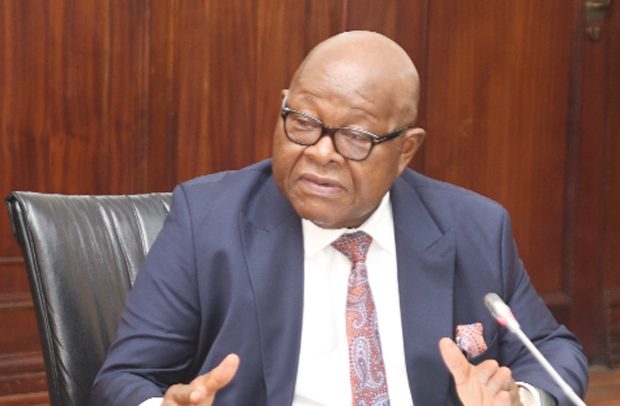Prof. Mike Oquaye
Former Speaker of Parliament, Prof. Mike Oquaye, has criticised the National Democratic Congress (NDC) government over its handling of the processes leading to the suspension of Justice Gertrude Torkornoo as the Chief Justice.
According to him, the judiciary must be insulated from political interference and control, adding that the current handling of the matter by the government risks eroding confidence in the rule of law.
He has also expressed his reservations about the constitutional provision requiring that the hearing of the case calling for the removal of the Chief Justice must be done in-camera.
He believes that the decision to hold the proceeding in-camera could benefit the person who initiates the removal process.
“I am concerned about certain issues that I consider vital, particularly the trial in-camera provision. You will ask yourself what the rationale is for that provision in our constitution, what is its purpose, and if we are to give it a purposeful interpretation, where shall we go? The purpose is to benefit the people of Ghana as a whole, that the Chief Justice must be tried in-camera…,” Prof. Oquaye said in an interview on Joy News.
President John Mahama on April 22, 2025, suspended Chief Justice Gertrude Sackey Torkornoo following the setting up of a five-member committee to probe the three petitions calling for her removal from office.
The suspension followed the finding of prima facie by the Council of State following the forwarding of the three petitions by the President.
The Supreme Court has by a 3:2 majority decision dismissed an application which sought it to order President John Mahama to revoke the suspension of Justice Gerturde Torkornoo as the Chief Justice.
The court did not give a full reason for its decision, but indicated that having reviewed the processes filed before the court and having listened to counsel for the applicant and the Deputy Attorney General, the application seeking further action being taken by the President as well as the order reversing the warrant suspending the Chief Justice is refused.
There have been various criticisms of the ongoing process and its impact on the independence of the judiciary, and a possible political interference in the work of the judiciary.
Ridiculous Process
Prof. Oquaye is the latest person to raise concerns about the transparency and integrity of the process which has been widely criticised by many.
“From the very beginning, the constitution tells us justice belongs to the people, it emanates from the people, justice belongs to all of us people, one may say that this provision could be advance to the one that says trial must be done in-camera,” he said.
Prof. Oquaye also criticised the provision of Article 146(10) which calls for the suspension of the Chief Justice upon the establishment of a prima facie and the setting up of a five-member committee to probe the petition, calling it ridiculous.
“Let us revisit this whole procedure as provided by law,” he said during the interview, and wondered, “Why did we allow this law to exist for so long, and the people who are now criticising the system said nothing about this?”
“Judgement is by majority, so the two Supreme Court judges may say ‘Yes’, and the three civilians, ordinary people, may say ‘No’. The three must hold because it is a majority. And then, thereafter, there is no appeal. The matter is closed. My brother, if it were you, would you appear before such a court? It is ridiculous. I don’t blame anybody, it is there in our law,” Prof. Oquaye added.
BY Gibril Abdul Razak


